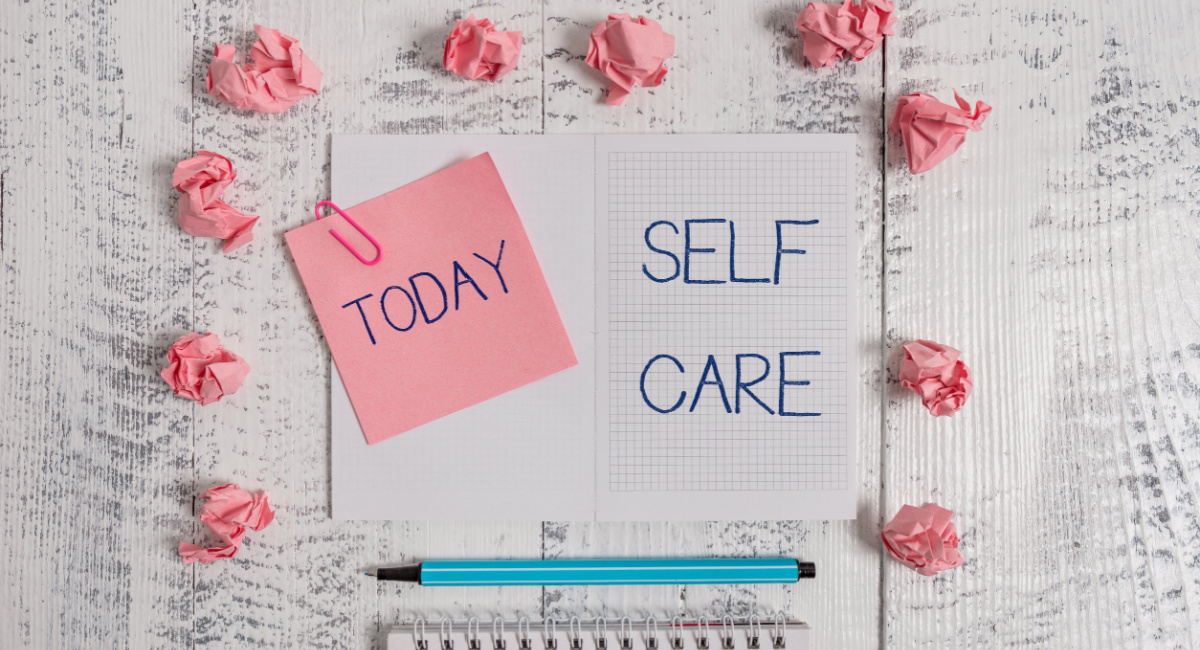What makes you feel alive? It could be hiking in the woods, catching up with friends or reading a good book. Maybe it’s watching squirrels in the park, petting your cat or playing an instrument. The things that bring you energy matter — they shouldn’t always be last on your priority list. In this article by guest blogger Cora she is going to share with us 5 reasons and tips on how to not feel guilty about self care.
Many people feel guilty about taking time for themselves, whether sitting down for 15 minutes, buying new shoes or going to bed early. Some individuals are afraid of being selfish to the point that they ignore meeting their own valid needs.
This can turn into a form of escapism that is very unhealthy. Your needs matter just like everyone else’s. When you take care of your physical, mental and emotional requirements, you’re affirming your value as a human being. Rather than being selfish, self-care establishes healthy boundaries that will improve all your relationships.
Here is how to not feel guilty about self care and things to remember about why you should care for yourself first
Before we get into this awesome inspirational article please check out my self help eStore! Mini self help books, courses, programs and even one on one coaching! Click the link here,see what’s ‘in store’ for you and grab the tool you need!
How to not feel guilty about self care
The definition of self-care is pretty obvious: it means taking care of yourself. This includes actions like eating healthy food, working out, sleeping, connecting with loved ones and making time for the things you enjoy doing. As an adult, you need to take on the responsibility for your self-care. It’s up to you to be kind to yourself, protect your health and nurture your spirit.
Self-care can be hard to practically define because it looks different for every person. What restores one individual’s peace of mind might be the same thing that stresses another one out. For example, hiking alone fills some people with joy, while the intensity can cause physical and mental strain for others.
Self-care is different for every person, but some activities never qualify. Destructive behaviors like binge drinking or self-harm may give temporary emotional relief. However, they don’t come from a place of affection for yourself and will lead to increased distress in the future.
There’s a lot of confusion about what selfishness means. Someone who’s selfish puts their needs before those of other people — most, if not all, of the time. However, it’s not selfish to put your needs first some of the time. This teaches other people to be unselfish.
Parents often struggle with putting themselves first when necessary. They love their children, so they put their kids’ needs before their own daily. However, it’s perfectly reasonable for them to eat, take showers and get some rest when their kids would rather play with them. Setting a boundary for self-preservation lets adults teach their kids that other people matter, too.
Self-care can become selfish if you use it as an excuse to always put yourself first. If you are always focused on your own needs, you should probably check yourself. However, many people struggle to believe their personal needs are valid. You should never feel guilty for meeting your basic needs and showing compassion toward yourself.
Self-care starts with understanding what is essential for your well-being and then prioritizing those things. For example, you may realize you feel sick if you don’t eat lunch. That means lunch should be a priority — even on busy work days or when a friend calls you to ask for a last-minute favor at noon.
Many acts of self-care have health benefits, as well. While an extensive skin care routine might seem unnecessary to some, it can cleanse dirt from your skin, heal scars and prevent sun damage. Activities like jogging or sitting out in the sun can provide vitamin D to your body, while getting enough sleep is key in functioning well throughout the day.
A huge part of self-care is learning to set healthy boundaries. Find the places where your limitations are being breached by thinking about the people, places and activities in your life that make you feel stretched too thin. Then ask yourself what is bothering you in those situations and how you’d like them to be different.
The best way to practice self-care is to ask yourself what you need. If you don’t know, experiment with treating yourself to a restorative activity. Ideas include going for a walk, ordering dinner in, having an impromptu friend movie night or reading a favorite book you haven’t picked up in a while. Over time, you’ll learn more about yourself and what activities are most therapeutic for you.
4. Self-Care Builds Resilience
You may have heard the phrase, “you can’t pour from an empty cup.” This describes the effect of self-care — when you take time to meet your own needs, you’re better equipped to care for others. This builds resilience so you can face life’s challenges with confidence instead of feeling panicked by additional responsibilities.
You may experience burnout when you don’t make time for non-negotiable self-care. Symptoms include emotional exhaustion, increasing negative thoughts, poor performance at work and feelings of panic. It can cause you to feel trapped and overwhelmed for seemingly no reason.
Self-care can help you reclaim your life and build the resilience you need to protect yourself from burnout. It brings structure to your day and prioritizes rest so you know you’ll have time to recuperate from the stress of life. Self-care makes enjoying life a priority by building it into your schedule as a non-negotiable.
5. Self-Care Allows You to Find Yourself
It can be hard to move through life when you don’t have a strong sense of self. Taking time to nourish yourself in a variety of ways can help you feel present and mindful. If you’re constantly doing things only to serve others, you can lose touch with yourself.
When all you do is go to work or serve your family, you can start to feel like your life is not your own. You may lose motivation if you don’t feel fulfilled with what you’re doing. But practicing self-care can help you refocus your life. Maybe you want to improve your spiritual life through yoga, meditation or journaling. Or you can find fulfillment in a hobby that you just do for yourself.
Any time you spend focusing on self-improvement and happiness can benefit all aspects of your life. That dedicated self-care time can help relieve any frustration or stress that comes from daily responsibilities. Then, you’ll feel more energized when it comes time for work and other tasks.
Self care is important!
It can be challenging to accept sometimes, but your needs are just as valid as those of other people. Self-care is acknowledging what you need and taking care of yourself like a kind parent cares for their child. It’s not selfish to treat yourself as a person with inherent value.
Self-care can become selfish if you always put your needs before others. However, it’s not selfish to take time for activities that strengthen your body, enrich your mind and nourish your spirit. Self-care is restorative and builds resilience so you’re prepared to face life challenges with energy and hope.
It’s easy to be overrun by the many worries and responsibilities you face every day. Self-care is a way to intentionally schedule joy back into your life. You should never feel guilty about treating yourself like a person who is worthy of love.
Author bio: Cora Gold has a passion for living a happy, healthy and fulfilling life. As Editor-in-Chief of women’s lifestyle magazine Revivalist, she aims to inspire others to do the same.
- 21-Day Self-Improvement Challenge: A Step-by-Step Guide – 26/01/2023
- 30 Brutal Narcissistic Abuse Quotes That Will Hit You in the Feels – 10/01/2023
- How to Find Self Love in 10 Beautiful Steps – 01/01/2023









Leave a Reply